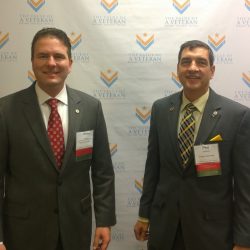It’s Not What You Say, It’s How You Say It
February 26, 2019 Categories: Bachelors Degrees, Military
As I look, some of the most important lessons I've learned, whether it's been as a leader, family member, or educator, have been on how to communicate properly.
Years ago, when I was a developing as a young leader, I remember looking at a problem and then issuing guidance with my soldiers in a raised voice. At the time I felt that this was an effective way to communicate in this situation, and once they saw that I was being direct, they instantly jumped into action to follow my orders. I continued this method as I rose through the ranks to become a more senior leader.
One day while communicating with my fellow senior leaders in much the same way as I had with my subordinates, I was surprised not to receive the same response. Although they followed my guidance, I could tell by their facial movements and body language they were not very receptive to my delivery of the information.
That's when the highest-ranking leader in our unit came to me and said that he wanted me to take a class to help improve my communication skills. Honestly, I was a little surprised at the time I thought my communication skills were just fine. Whenever I offered guidance, it was always followed without question.
It took just a just a few minutes in this class to realize that my superior was right - my communication skills needed improvement. As leaders, we need to not only perfect what we say, but also how we say it. This was my opportunity to become a better leader by learning how to adjust my delivery.
The effective communication lessons I have learned over the years may be simple, but are proven true on almost a daily basis:
- Know your audience. Do you speak to your spouse the same way you do to your children? Do you speak to your troops the same way you speak to your superior? Of course you don't. Adjust your tone, choose your words wisely, package your message for the situation, and consider the audience and environment before you deliver the message.
- Communicate with confidence. Know your subject matter well, and ensure that your posture and eye contact portray the same confidence that your words do. If writing rather than speaking, then ensure the tone, structure, and salutations are packaged appropriately. This helps your message to be delivered and received professionally and confidently.
- Choice of medium. Not every communication needs to be verbal, but not every communication is appropriate for a text or email. Ensure that you are using the correct form of communication that is appropriate for your message. Urgent communication does not take place via email, it warrants a phone call or a face to face meeting.
- Clearly define action. If you are communicating an action, ensure that the action required is clearly received. Do not end the communication without a confirmation that the action has been effectively communicated. Repeat the action more than once and ask the receiver to repeat the expectation back to you. This clarity is needed to ensure mission accomplishment.
By using these simple techniques, along with perfecting my delivery, I was finally able to ensure I was communicating effectively. I found that it was not just what I was saying, but how I was saying it. As an experienced leader, I knew that I had to communicate calmly, effectively, and with purpose.
My superior helped me to learn a valuable lesson, and as leader, we should always be looking for ways to improve ourselves and those around us. Education allowed me to improve my skills and abilities, but I also learned the importance of feedback, especially from someone who cares about you. Many times, when we receive feedback in a developmental area we become sensitive and react defensively when we should be looking at it in a positive manner.
If someone cares enough to provide us feedback, it is because they want us to become better at what we do. Successful leaders understand that communication is much more than giving orders. Not only do we need to master our delivery, we need to be just as willing to listen and accept feedback from the other leaders around us.
Philip F. Johndrow (pictured on the right) is a 33-year military veteran and a graduate of Trident's Bachelor of Science in Business Administration and Master of Business Administration programs. He currently serves as Trident's National Director of Military & Veteran Alliances.

